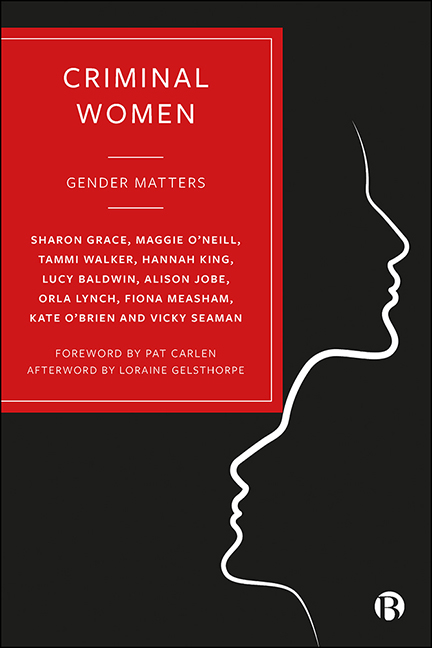Book contents
- Frontmatter
- Contents
- List of Figures and Table
- Notes on the Authors
- Acknowledgements
- Foreword
- Introduction
- 1 Hearing the Voices of Women Involved in Drugs and Crime
- 2 Knifing Off? The Inadequacies of Desistance Frameworks for Women in the Criminal Justice System in Ireland
- 3 Sex Work, Criminalisation and Stigma: Towards a Feminist Criminological Imagination
- 4 Criminal Women in Prison Who Self-harm: What Can We Learn from Their Experiences?
- 5 Criminal Mothers: The Persisting Pains of Maternal Imprisonment
- 6 ‘The World Split Open’: Writing, Teaching and Learning with Women in Prison
- 7 Women’s Biographies through Prison
- Afterword
- Index
Afterword
Published online by Cambridge University Press: 15 September 2022
- Frontmatter
- Contents
- List of Figures and Table
- Notes on the Authors
- Acknowledgements
- Foreword
- Introduction
- 1 Hearing the Voices of Women Involved in Drugs and Crime
- 2 Knifing Off? The Inadequacies of Desistance Frameworks for Women in the Criminal Justice System in Ireland
- 3 Sex Work, Criminalisation and Stigma: Towards a Feminist Criminological Imagination
- 4 Criminal Women in Prison Who Self-harm: What Can We Learn from Their Experiences?
- 5 Criminal Mothers: The Persisting Pains of Maternal Imprisonment
- 6 ‘The World Split Open’: Writing, Teaching and Learning with Women in Prison
- 7 Women’s Biographies through Prison
- Afterword
- Index
Summary
No one should underestimate the impact of Criminal Women, published in 1985, not least because it emerged at a time when, although there was some awakening of interest in the misfortunates of women in conflict with the law and enmeshed in the criminal justice system (CJS), there was by no means proper recognition of the need for gender-sensitive or gender-responsive policies and practices. The book was powerful; the women's stories of their experiences of pathways into crime and experiences of the CJS and allied agencies harrowing.
In some ways, the intervening years between then and now have led to two steps forwards and three steps backwards in penal policy and practices. We have witnessed the development of community centres or services for women following the Together Women initiative taken by the Labour Government in the early 2000s, building on best practice developed by small-scale projects such as the 218 Centre in Scotland and the Asha Centre in England and Wales, and leading to the creation of over 40 such community centres for women at risk and women caught up in the CJS. Often, these have served as places of hope and of refuge for women, where there has been genuine care, constructive dialogue and steps forwards and away from crime and the CJS. At the same time, we have seen such centres falter and collapse through a lack of funding. In 2018, we saw a Conservative Government Female Offender Strategy which appears to recognise the need for early interventions. These interventions include practical help and increased diversion from the CJS, community solutions which revolve around the concept of ‘whole system approaches’ and holistic support, including support for those subject to domestic abuse, all to ensure that fewer women end up in custody. A third strand of developments in the 2018 Female Offender Strategy concerns the need for ‘better custody’ (improving safety, health and wellbeing, contact with children and families and helping women more effectively in relation to education and employment, for instance). A UK government policy, Concordat on women in or at risk of contact with the Criminal Justice System, across different agencies emerged in December 2020 to endorse the chief aims of the Female Offender Strategy. This was heartening. Then, January 2021 brought news of the creation of 500 extra places in women's prisons.
- Type
- Chapter
- Information
- Criminal WomenGender Matters, pp. 173 - 174Publisher: Bristol University PressPrint publication year: 2022



